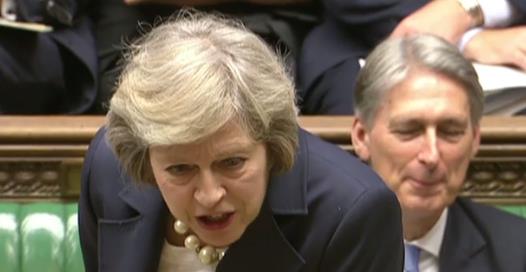Theresa May delivered her first Prime Minister’s questions in the House of Commons on Wednesday afternoon and came through the event relatively unscathed with a touch of “Thatcher” to her performance as some commentators noted.
Her former boss, David Cameron, developed a competent, confident and charismatic approach to PMQs. May scored well in two of these areas but lacked the charisma of her former boss.
Competent: May was certainly on top of her brief but rarely had to open up her folder of prepared answers since many of the questions were of a general nature or came from unusual angles.
Confident: May looked confident most of the time although she was obviously holding back nerves. She let out what looked like a sign of relief (or maybe a prayer) when she sat down after her last reply.
Charismatic: May needs to improve in this area. While there were plenty of gags and informal talk, most of the jokes fell a bit flat since they could be seen coming from far off. Delivery could be improved here.
Unscrupulous boss
Her best one liners occurred around 12:11pm and received roars of support from her backbenchers, an important show of unity from the Conservative benches after their bruising EU referendum campaign and leadership battle. The joke was about an ‘unscrupulous boss’ – a gag which Jeremy Corbyn had used the week previously to good effect in David Cameron’s final PMQs which made it obvious where it was coming from. But Theresa May (TM) had a few extra punch lines of her own thrown in and got an enormous roar of approval at the end.
TM: that there are many members on the opposition benches
who might be familiar with an unscrupulous boss
Chamber: ((some laughter))
TM: er a boss who doesn’t listen to his workers
er a boss
Chamber: ((cheers of agreement))
TM: a boss who requires some of his workers
to double their workload
Chamber: ((laughter))
TM: a boss (.) and maybe even a boss
who exploits the rules to further his own career
Chamber: ((noise)
TM: remind him of anybody
Chamber: ((noise and shouts of ‘more’))
It was the way the final punchline ‘remind him of anybody’ was delivered that many people recalled Margaret Thatcher’s modus operadi. Michael Deacon from the Telegraph thought he had seen a ‘ghost’:
“But the way Mrs May delivered that last line: the icy imperiousness, the deepening of the voice, the thudding sarcasm… It was uncanny. More than uncanny, it was chilling. I felt as if I’d seen a ghost. Or at least heard one.” (Deacon, M. The Telegraph)
Brexit means Brexit
May also outlined in more detail what he term ‘Brexit means Brexit’ means. I have been tracking this slogan from its inception in mid-July when May used it in her bid for the leadership of the Conservative party. Today she revealed more about her intentions:
TM: and can I assure him
that as we (.) look at er the result of the referendum
I’m very clear brexit does mean brexit
as he says (.) we will make a success of it
er what we need to do (.) in negotiating the er deal
is to ensure that we listen to what people have said
about the need for controls on free movement
but we also negotiate (.)
the right deal and the best deal
of er trade in goods and services
for the British people
Remain means Remain
An interesting counterpoint to ‘Brexit means Brexit’ came from Angus Robertson, the leader of the SNP in Westminster, who coined the phrase ‘remain means remain’ for Scotland; a reference to the fact that the Scottish people voted overwhelmingly to remain in the EU.
AR: and will she do everything to ensure
that remain means remain for Scotland




1 Pingback